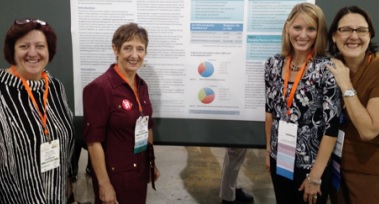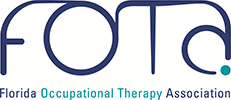Poised for Success
(First in a series of articles describing FOTA’s Leadership Development Program) By Susan Hermes, OTD, BCP, OTR/L and Elena Vizvary, MS, OTR/L
By Susan Hermes, OTD, BCP, OTR/L and Elena Vizvary, MS, OTR/L
FOTA has a long history of being a leader in occupational therapy state associations and innovations as one of the early established state associations and licensure. The Leadership Development Initiative emerged from passionate members approaching elected leadership of Florida Occupational Therapy Association (FOTA). These members had been involved with American Occupational Therapy Association (AOTA) Emerging Leaders and Emerging Managers programs with positive professional outcomes. The question was raised if something similar would be a match for the membership needs and the FOTA strategic plan. A small committee was formed to determine if mentoring or leadership was the direction that would fit the current members needs, marketing, and leadership efforts. Compromise and constant collaboration to make sure sequential steps were followed to gather information and align with evidence based content to guide the successive years.
|
2016 OT/OTA Student Survey Barriers to State Membership
|
2016 OTA/OTA Student Survey What could FOTA do for you?
|
Rationale and literature review
Finding and nurturing volunteer leaders in state associations can be difficult. Those interested in volunteer leadership have little idea about who to contact and how to get started; opportunities lost for individuals and associations. Leadership opportunities can support professional growth and development (Dunbar, 2009). Mentoring is one method fundamental to building leadership capacity, empowering future leaders and influencing the sustainability of the profession as a whole (Lapointe, Baptiste, von Zweck & Craik, 2013). Numerous national initiatives establish that allied health professionals value mentoring; and it is second only to education in contributing to professional success (Scheerer, 2007). AOTA launched mentoring programs through its Emerging Leaders Development Programs to advance the AOTA Centennial Vision (AOTA, 2015; AOTA, 2006). Its leadership model suggests a cyclic nature of building community and collective identity, endorsing the vision, challenging the process, and taking action (Moyer, 2007). For a state level project, the Ohio Occupational Therapy Association conducted an e-mail study to determine the frequency of mentoring, as well as the supports needed by its members. The results indicated mentoring partnership characteristics, linkaging, and resources were the key supports (Scheerer, 2007).
Historical details
FOTA members Becky Piazza and Susan Skees Hermes had successful participated individually with AOTA leadership development initiatives. Ms Hermes also had previous experience with Massachusetts Association for Occupational Therapy (MAOT) ad hoc committee membership for developing a state level mentoring team pilot. Both Ms. Piazza and Ms. Hermes separately approached Sara-Jane Crowley, then FOTA President, to discuss whether a similar structured mentoring and leadership program could be offered via the state OT Association. This trio was anxious to move forward – each with their own compelling reasons. Ms. Crowley was keenly aware of the low numbers of OTAs within FOTA membership ranks and wanted to explore avenues to increase those numbers. A critical discussion between these three professionals and new FOTA President, Elena Vizvary followed. Specific desired outcomes of this group varied from increasing OTA membership to facilitating mentor-mentee experiences. An official ad hoc committee to pursue information gathering was formed.
What occurred next was a needs assessment to determine organizational capacity to extend and build member-based leadership. An original focus was to identify potential FOTA leaders. Using an evidence-based practice, the Ad Hoc Committee gathered member-sourced information with convenience sampling of OT practitioners and students. Three separate 10-question surveys were conducted to identify how OT and OTA practitioners and students viewed mentorship and leadership development as an FOTA membership benefit. The third survey centered on an audience developed through data analysis of the first two.
Surveys and participants
- 2015 OT and OTA Practitioner Survey
- 2015 OT/OTA Student and 1st-Year Practitioner Survey
- 2016 OTA Practitioner/OTA Student Survey
The surveys were disseminated statewide through the listservs and Facebook pages of the nine FOTA regional representatives, the Florida Occupational Therapy Educational Consortium (FLOTEC) access to Student Occupational Therapy Associations (SOTA), and the FOTA Facebook. Participant opinions regarding state association participation, perceived membership benefits, interest in existing leadership opportunities, demographics, and volunteered suggestions were analyzed and categorized in themes specific to OTs and OTAs. The two first round survey results obtained in 2015 were presented at FOTA annual conference that year. The third survey further supported and provided additional details upon which FOTA could move forward with its Leadership Initiative.
The formal surveys and social media outreach of the Ad Hoc Committee found the following:
- More than half of OTA students and practitioners surveyed said professional organizations make a difference in the profession, however, more than half said they did not find benefit in joining FOTA.
- The majority were not interested in leadership positions, however, they are interested in leadership development.
- OTAs were less interested in leadership development than OTs in developing clinical competence.
- All OT practitioners and students are eager to engage with members of FOTA’s Special Interest Sections (SIS) to tap their experience and insights.
Survey Conclusion
Survey participants indicated that they were not interested in leadership positions, but in leadership development and mentor-mentee opportunities. As their most valued membership benefits, they also identified:
- opportunities to attend and/or present at annual conferences
- opportunities to increase networking within and across SISs
- development of a leadership program
After analyzing the survey results, the Ad Hoc committee presented a formal proposal to the FOTA Board in 2016 to move forward the leadership development training specific to OTA practitioners and OTA students. The President Elect Brent Cheyne was appointed Chairperson.
In late 2016, the FOTA Board approved and funded the Ad Hoc Committee’s recommendation to pilot a leadership training initiative. Concurrent with the approvals and planning, the initiating FOTA Leaders: Sara-Jane Crowley, Susan Hermes, Becky Piazza, and Elena Vizvary presented at AOTA Conference in April 2017 in order to promote and disseminate the results. A reduced copy of the poster was distributed to all attending members of the Affiliated State Association Presidents (ASAP) meeting prior to the same AOTA Conference. The inaugural FOTA Leadership Summit took place in August 2017 in Central Florida.
Future articles in this series will describe the educational programs developed by the FOTA Leadership Initiative, the progress realized and results for FOTA.
Members of FOTA Leadership Initiative include: Brent Cheyne, OTD, FOTA Past President; Sara-Jane Crowley, Adv.Dip.OT, OTR/L, Past AOTA FL RA Representative and AOTA RA Vice-Speaker, Past FOTA President; Susan Hermes, FOTA ad hoc Chairperson, past AOTA RA alternate, AOTA VLDC member; Becky Piazza OTD, OTR/L, BCPR, Past FOTA Regional Representative, AOTA VLDC member; and Elena Vizvary, MS, OTR/L, Past FOTA President.
ReferencesAmerican Occupational Therapy Association. (2007). AOTA’s centennial vision and executive summary. American Journal of Occupational Therapy, 61, 613–614. doi:10.5014/ajot.61.6.613.
Dunbar. (2009). An occupational perspective on leadership: Theoretical and practice dimensions. Thorofare, N. J. : Slack.
Florida Occupational Therapy Association. (2015). Strategic Plan. Retrieved from http://www.flota.org/assets/documents/Strategic.Plan/fota%20strategic%20plan.final.pdf
Lapointe, J., Baptiste, S., VonZweck, C. M, & Craik, J. M. (2013). Developing the occupational therapy profession through leadership and mentorships: energizing opportunities. World Federation of Occupational Therapists Bulletin, 68 (1), 38 – 43. DOI: 10,1179/otb.2013.68.1.011.
Moyers, P. A. (2007). A legacy of leadership: Achieving our centennial vision. The American Journal of Occupational Therapy, 61(6), 622 - 628.
Scheerer, C. R. (2007). Mentoring in occupational therapy: One state’s status. Occupational Therapy in Health Care, 21 (3), 17 – 33. DOI: 1.1080/J003v21n03 02
Yamkovenko, S. (2015). Beyond the centennial: Envisioning occupational therapy in 2025. Downloaded from https://www.aota.org/Publications-News/AOTANews/2015/beyond-centennial-envisioning-future-OT-aota-vision-2025.aspx
